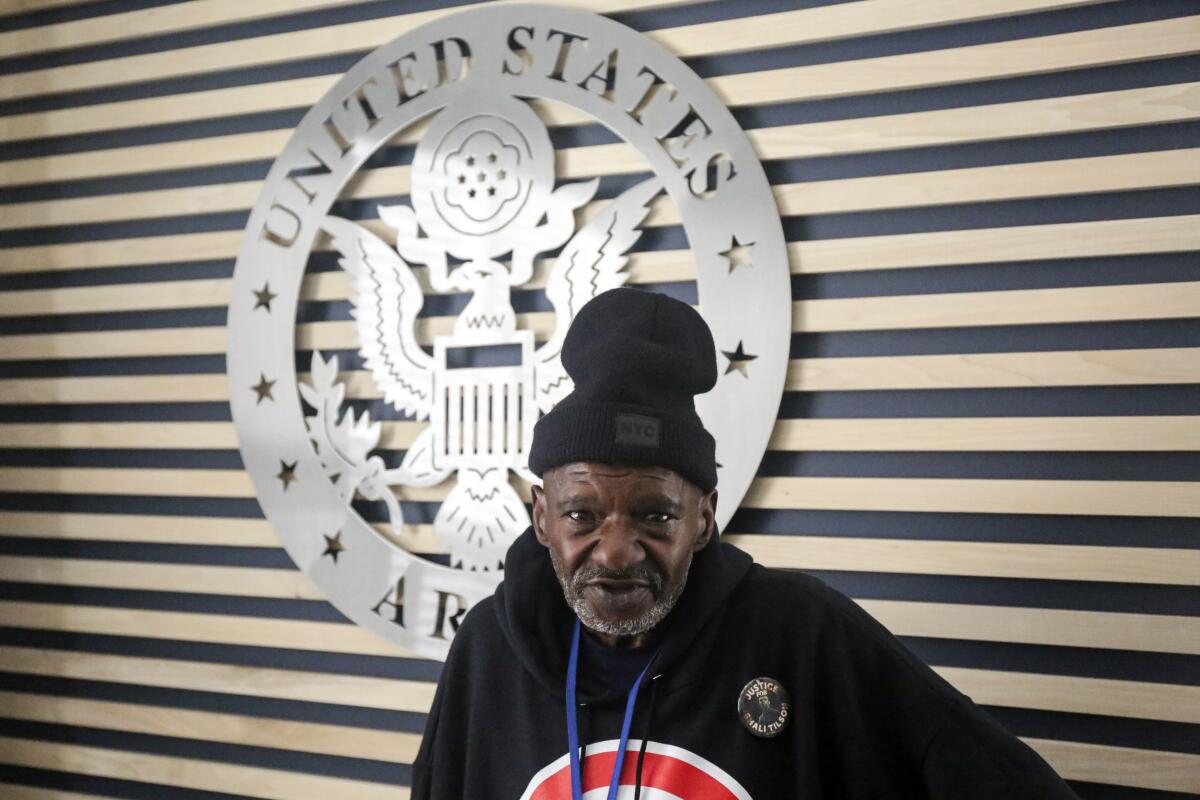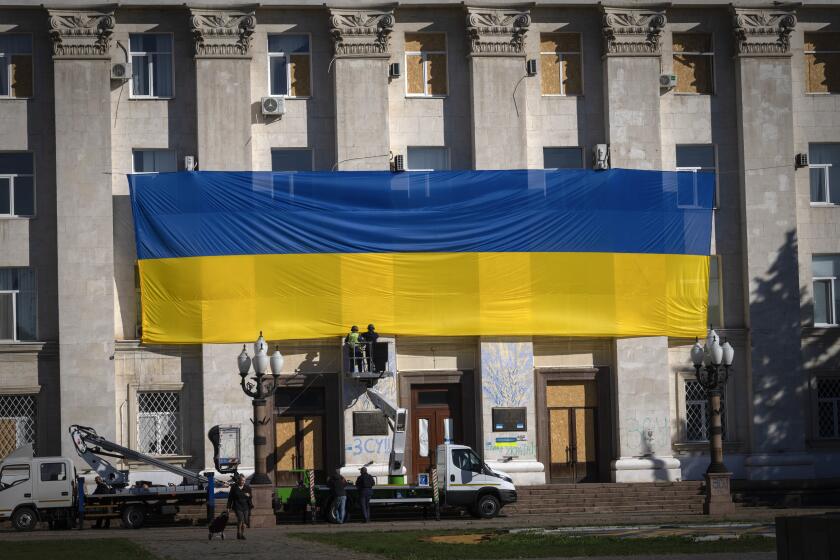Nonprofits making progress in tackling homelessness among veterans, but challenges remain

- Share via
ATLANTA — Along a busy Atlanta residential road, a 68-year-old Vietnam War-era Army veteran has found what he calls a “match made in heaven.”
Harold Tilson Jr. was homeless earlier this year but for the last few months has been living in transitional housing run by the nonprofit Veterans Empowerment Organization, or VEO. It provides emergency and permanent housing for dozens of previously homeless military veterans.
“If you’re homeless and you need help, you couldn’t ask for a better place to go because they take care of just about everything,” Tilson said.
It’s part of a years-long effort by government agencies and nonprofits around the country to address homelessness among veterans. Since January 2020, the numbers of homeless veterans have fallen 11% and have gone down 55% over the last 13 years, according to a government count. That’s in sharp contrast with the general homeless population.
Authorities credit the Obama administration’s work to make housing veterans a top priority and more recently the $1.9-trillion COVID-19 relief package that boosted the Department of Veterans Affairs’ homeless programs and expanded rental aid. Advocates also point to partnerships between government agencies, nonprofits and corporate foundations.
Last month, the VA gave $1 billion in grants to community nonprofits for the upcoming year to tackle the issue, the most ever, said Jill Albanese, director of clinical operations at the Veterans Health Administration’s Homeless Programs Office.
“This isn’t something that we’re doing on our own: This is really something that we’re doing through partnerships,” Albanese said. “They’re the experts on homelessness in their communities.”
One year since Ukraine retook the city of Kherson from occupying Russian forces, residents have grown accustomed to the sounds of the bombs reminding them that the war is far from over.
Still, the number of veterans living on the streets is significant. There are more than 33,000 homeless veterans, according to the 2022 Point-in-Time count conducted by the VA and Department of Housing and Urban Development, as well as the U.S. Interagency Council on Homelessness.
And much still needs to be done, said Kathryn Monet, chief executive of the National Coalition for Homeless Veterans, calling it a “moving target” — just as people are moving out of homelessness, others become unhoused every day. Affordable housing is key, she said, though communities nationwide have struggled with that.
Along with housing, the VEO offers classes about financial literacy, securing VA benefits and how to get on a path toward employment and housing independence. There’s also a common area for reading and a gym for working out.
“We are proud to say that we are not a shelter. This is a program center, meaning the veteran has to put some skin in the game,” said Tony Kimbrough, a former military intelligence officer and CEO of the nonprofit, which started in 2008 with a single two-bedroom house. “We’re going to put a ton of it in there, but we expect a little bit of back-and-forth.”
Tilson became homeless in February when he was forced out of the triplex he was renting south of Atlanta.
He spent the next month and a half sleeping in the street or on business doorsteps, relying on friends from his church for food or access to a shower. Church members steered him to local nonprofits and he eventually landed at VEO, where he has been living in emergency housing, has taken a five-week financial literacy course and is focused on improving his credit score.
Tilson, who suffered a stroke last year, said he needs a knee replacement and hernia surgery to address the physical toll carrying his belongings took while he was homeless. A VA case manager is helping him get those, and he’s optimistic that in a few months he’ll get to move into his own place, with the help of VEO and another local nonprofit.
His friends from church are thrilled about the help he’s getting, Tilson said, but “nobody can be happier than me.”
In addition to 10 double-occupancy rooms housing veterans like Tilson in emergency shelter, the VEO campus has 41 apartment units where veterans pay a few hundred dollars in rent. VA funding makes up the difference, allowing the nonprofit to reinject the money and expand.
Its next project is 20 single-occupancy bedrooms being built this winter.
VEO says its expansion would not be possible without more than $2.3 million in corporate donations from the Home Depot Foundation.
The Atlanta-based foundation has helped some 50,000 homeless veterans nationwide through its partnership with nonprofits such as VEO. It has donated $500 million to veterans causes since 2011, and on Friday announced a commitment to giving an additional $250 million by 2030.
Company employees have also volunteered more than 1.5 million hours in service to veterans, including building or repairing 60,000 houses and facilities for former service members. On Friday, 20 members of “Team Depot” were finishing a weeklong project to build a garden, complete with a water feature, in honor of Veterans Day.
“When we think about the role that corporate foundations can play, it boils down to three things,” said Jennifer A. Taylor, a political science professor at James Madison University and a military spouse who studies philanthropy and veterans issues.
“Are you a funder — giving out grants for others to do the work? Are you a doer — taking employees out into the community? Or are you a convener — bringing thought leaders together?” Taylor said. “Home Depot is doing all of those things.”
Home Depot CEO Ted Decker said the company’s giving philosophy was always housing-centric but was “pretty disparate” before 2011. That’s when then-CEO Frank Blake, realizing that tens of thousands of employees were veterans or spouses of veterans, decided to focus the company’s philanthropy on veteran housing.
“It fit our culture,” Decker said.
Despite the progress that’s been made, there are still tens of thousands of homeless veterans, including nearly 3,500 in the Los Angeles area.
Navy veteran Malcolm Harvey III spent years living on the streets in Southern California, including Los Angeles’ Skid Row. In 2015, a representative from the nonprofit U.S. Vets helped him get a job with the organization. Speaking gigs on behalf of the Home Depot Foundation followed.
Now, Harvey, 62, is married, owns a condo and works as program director at the Long Beach nonprofit People Assisting the Homeless.
“We can’t become numb to this,” Harvey said of the homelessness problem among former service members.
“We made a promise to them when they took that oath and put on that uniform and decided to defend this country,” he said.
“We owe them a debt of gratitude. But we owe them more than that: We owe them action.”
_
More to Read
Sign up for Essential California
The most important California stories and recommendations in your inbox every morning.
You may occasionally receive promotional content from the Los Angeles Times.











